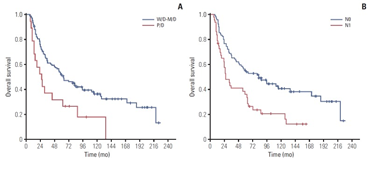글로벌 연구동향
방사선종양학
![[Cancer Res Treat.] Long-Term Outcome of Distal Cholangiocarcinoma after Pancreaticoduodenectomy Followed by Adjuvant Chemoradiotherapy: A 15-Year Experience in a Single Institution.](/enewspaper/upimages/admin_20170523111512_R.jpg) 2017년 05월호
2017년 05월호
[Cancer Res Treat.] Long-Term Outcome of Distal Cholangiocarcinoma after Pancreaticoduodenectomy Followed by Adjuvant Chemoradiotherapy: A 15-Year Experience in a Single Institution.이화의대 / 김병혁, 김규보*
- 출처
- Cancer Res Treat.
- 등재일
- 2017 Apr
- 저널이슈번호
- 49(2):473-483. doi: 10.4143/crt.2016.166. Epub 2016 Aug 23.
- 내용

AbstractPURPOSE:
This study was conducted to evaluate the long-term outcome in patients undergoing pancreaticoduodenectomy (PD) followed by adjuvant chemoradiotherapy for distal cholangiocarcinoma (DCC) in a high-volume center and to identify the prognostic impact of clinicopathologic factors.
MATERIALS AND METHODS:
A total of 132 consecutive patients who met the inclusion criteria were retrieved from the institutional database from January 1995 to September 2009. All patients received adjuvant treatments at a median of 45 days after the surgery. Median follow-up duration was 57 months (range, 6 to 225 months) for all patients and 105 months for survivors (range, 13 to 225 months).
RESULTS:
The 5-year locoregional recurrence-free survival (LRRFS), distant metastasis-free survival (DMFS), disease-free survival (DFS), and overall survival (OS) rates were 70.7%, 55.7%, 49.4%, and 48.1%, respectively. Univariate analysis revealed poorly differentiated (P/D) tumors and lymph node (LN) metastasis were significantly associated with DMFS and OS. Additionally, preoperative carbohydrate antigen 19-9 level was significantly correlated with DFS, LRRFS, and DMFS. Upon multivariate analysis for OS, P/D tumors (p=0.015) and LN metastasis (p=0.003) were significant prognosticators that predicted inferior OS. Grade 3 or higher late gastrointestinal toxicity occurred in only one patient (0.8%).
CONCLUSION:
Adjuvant chemoradiotherapy after PD for DCC is an effective and tolerable strategy without significant side effects. During long-term follow-up, we found that prognosis of DCC was mainly influenced by histologic differentiation and LN metastasis. For patients with these risk factors, further research should focus on improving adjuvant strategies as well as other treatment approaches.
Author information
Kim BH1,2, Kim K3, Chie EK1, Kwon J1,4, Jang JY5, Kim SW5, Oh DY6, Bang YJ6.
1 Department of Radiation Oncology, Seoul National University College of Medicine, Seoul, Korea.
2 Division of Biological Warfare Preparedness and Response, Armed Forces Medical Research Institute, Daejeon, Korea.
3 Department of Radiation Oncology, Ewha Womans University School of Medicine, Seoul, Korea.
4 Department of Radiation Oncology, Chungnam National University School of Medicine, Daejeon, Korea.
5 Department of Surgery, Seoul National University College of Medicine, Seoul, Korea.
6 Department of Internal Medicine, Seoul National University College of Medicine, Seoul, Korea.
- 키워드
- Adjuvant chemoradiotherapy; Distal cholangiocarcinoma; Pancreaticoduodenectomy
- 연구소개
- 비교적 드문 종양인 원위부 담관암의 장기간의 추적결과를 분석한 논문입니다. 모든 환자는 췌십이지장절제술 후 보조적 항암방사선치료를 시행받았으며, 위장관의 만성부작용 거의 없이 (0.8%) 5년 생존율 48%의 효과적인 치료성적을 보였습니다. 기존 연구결과들과 유사하게 종양분화도와 림프절전이가 생존율에 유의한 예후인자로 분석되었으며, 해당 위험인자를 가진 환자의 경우 현재까지의 항암방사선 보조요법 외에 더 효과적인 치료를 위한 노력이 필요하겠습니다. 종양발생률을 고려하였을 때 단일기관으로는 상당히 많은 수의 균일한 환자군을 충분한 추적관찰을 통해 분석한 연구로 담관암 연구자들이 참고할만한 논문이라고 생각됩니다.
- 덧글달기
- 이전글 [Am J Clin Oncol.] Phosphorylated Akt Expression as a Favorable Prognostic Factor for Patients Undergoing Curative Resection and Adjuvant Chemoradiotherapy for Proximal Extrahepatic Bile Duct Cancer.
- 다음글 [Target Oncol. ] Clinical Implications of Cytotoxic T Lymphocyte Antigen-4 Expression on Tumor Cells and Tumor-Infiltrating Lymphocytes in Extrahepatic Bile Duct Cancer Patients Undergoing Surgery Plus Adjuvant Chemoradiotherapy.







